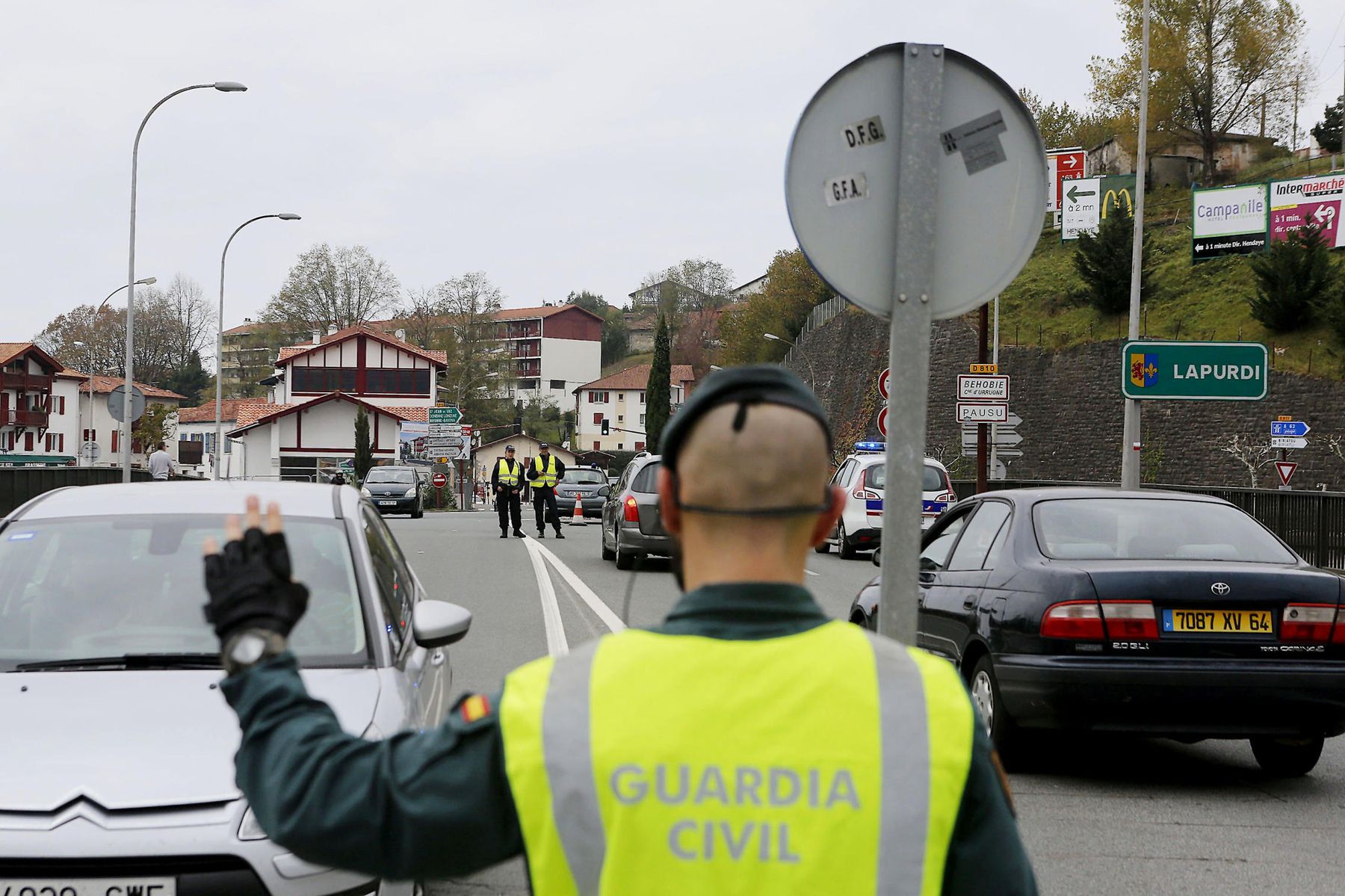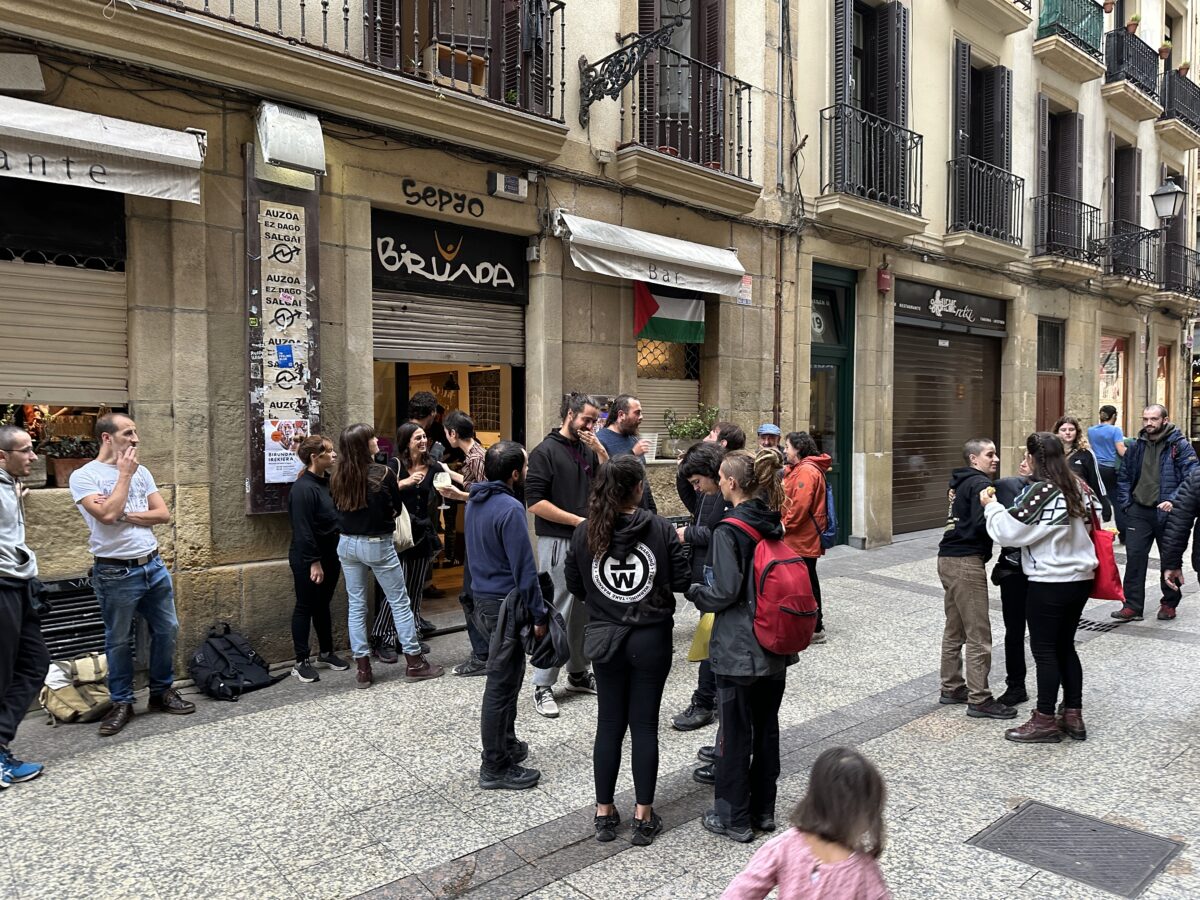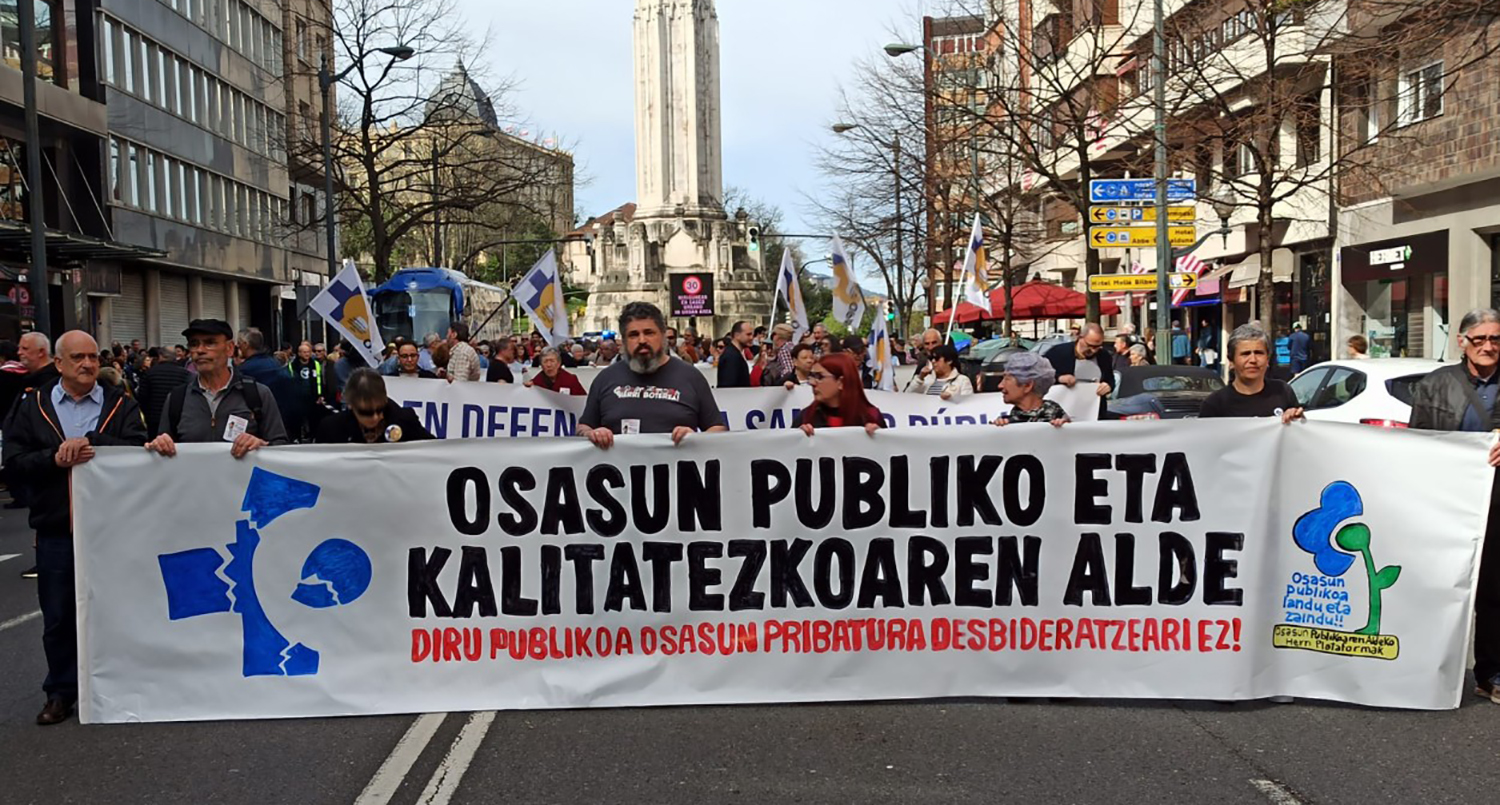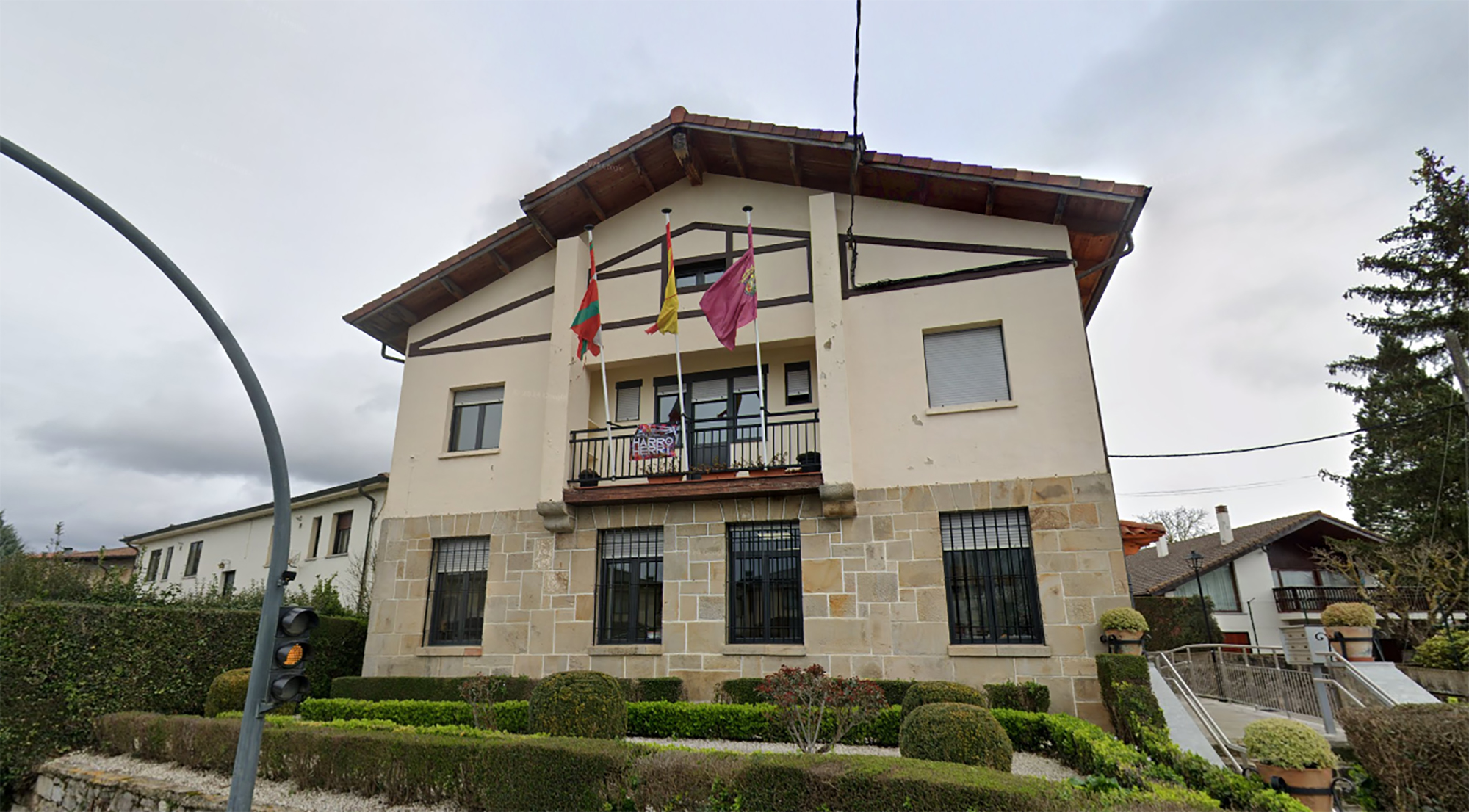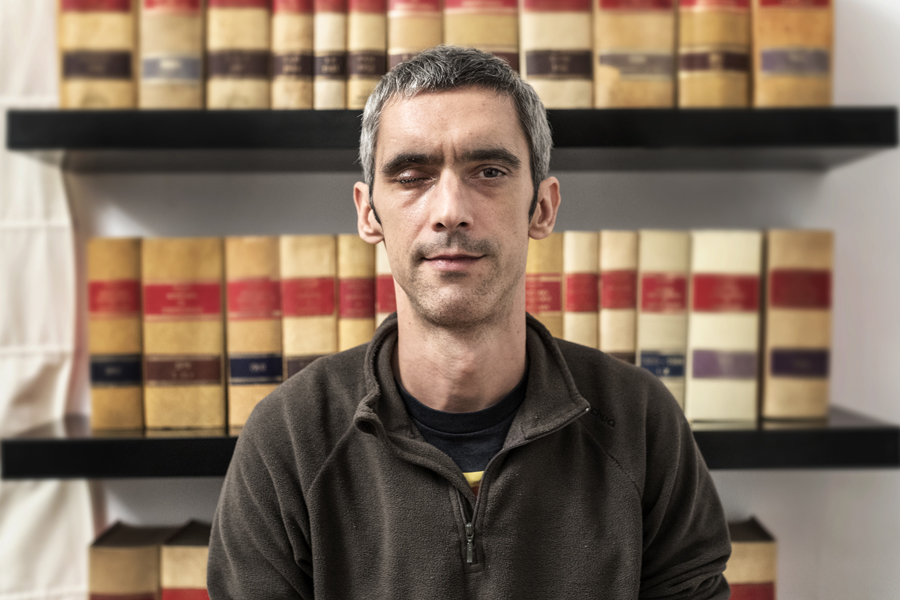"The book is a tool for action, so encourage it to be used"
- After three years of slow firing, a book moves silently and hand in Euskal Herria: A book of recipes to enjoy transforming the world. The reader will find all the ingredients needed to carry out tasty and varied direct acts: instructions for cooking each recipe step by step, interviews with entrepreneurs who have produced memorable disobedient dishes or theoretical bases for an efficient and transformative kitchen, among others. All in a colorful cocktail of texts, photos, videos, drawings... Xabier and Mikel, who prefer to keep their real name, have explained the essence and why of the book.

How did the idea of the book come about and how many hands have you participated?
Javier: A first book appears in the book's bibliography: Street Art. urban art techniques and materials (Street Art. Prescribing of urban art techniques and materials). When I saw it, I said, this is what we need, but about disobedience. With this model, we made a draft proposal from some friends, we introduced it to several people, and we started there.
Mikel: Most people told us: “If you do it very well” [laughter]. But we formed a majo group in which we've participated a lot of people: at least 20 in creating content, drawings, images, now there are dozens of people in the distribution... It's been very coral.
And what's the goal?
Javier: We believe that not only is disobedience important, but it is an essential tool if we really want to change things. Debates on ways of fighting have not been held many times in popular movements, and we wanted to make a contribution.
Mikel: We also wanted to pick up what things and how they have been done in the area of disobedience. How to hang from a bell tower? How do you stop a train? How to make secure communications on the network? We think there's a lot of people willing to do things if we share knowledge, and so that's what the book comes to.
It is a special book both from an aesthetic point of view and from an internal organization.
Javier: We've paid special attention to the content, the image, the design -- we wanted it to be attractive. Doing in color was an important bet because the price goes up a lot. It's not a book that requires reading the end from the very beginning, it's a book of consultation. [Going through the pages of the book] You might want to know how to destroy the heavy machinery, what to do in front of the Police's tear gas, a third party can paste large images on the walls: go directly to the corresponding chapter.
What kind of people have you driven the project? Experts, experts in different policy areas...
Mikel: We are people who are in popular movement, who want to contribute in the line of disobedience and in the current situation. Activists from all over the Basque Country.
Javier: There is a great diversity of ideology behind the book, people who have participated in very different movements, and everyone has contributed from their field.

In December you started to distribute the book, the form is not conventional either.
Javier: Distribution in hand. The book is anonymous, because we believe that by its nature it needed it, but also by its security.
Mikel: That requires more work and involves lengthening the distribution process, but we have also seen that distribution involves people and we are happy. It's reaching all of Euskal Herria, from word to mouth and from hand to hand.
How many units have you taken out and how is the sale going?
Javier: We've taken out 750 units and they're about to run out. Seeing success, we will take a second edition.
Publication has been the book's first disobedient action, right? A friend told me that when I put the ISBN on the computer, I had taken a big surprise ...
Mikel: [Laughter] We've taken a poetic license, and throughout the book there are other hidden gestures, you'll understand what you have to understand.
Disobedience is the soil of the Recipe book, but there are many ways to understand disobedience. What do you propose?
Javier: We say this in the book. “Aside from the Orthodox, this book will define in its own way the concept of disobedience, without pretending that the debate is closed.” We distinguish disobedience from laws and norms, on the one hand, and disobedience from customs imposed on the other. In this second we have not deepened because there is already the book of the 100 commitments of the Free Territory, which deals extensively with the issue. In the field of legal and regulatory disobedience we distinguish four types of actions: civil disobedience; resistance, lack of cooperation and direct action. In practice, the limits between the four are often erased. The book is more oriented towards direct action, but it seemed important to us to give a general theoretical position. Theory oriented to practice.
The title says that his recipes are “to transform the world”, but also to “enjoy” transforming the world. Why enjoy it?
Javier: Disobedience has consequences: repression, imprisonment, economic fines, blows. We have to be mindful and accept, but it seems to us that the focus is too often on it.
Mikel: When militancy is a source of pleasure, it's much more attractive. Sometimes it also has sacrifice, but we want to claim that transforming the world is a pleasure. That has strength. When you make an initiative, what you feel is very strong, and when the joy that you bring home comes out, that's great.
"Without confrontation, political positions do not change and the status quo wins"
The book picks up recipes for doing very different things, from making templates for painting walls to sabotaging excavators or train catenaries. What was your criterion for deciding what to exclude?
Javier: In the current political context, we have tried to introduce recipes which, in our view, make disobedience as positive as possible. He tells us that he has missed harder forms of struggle, and that some of the ones we have received are very hard and have given them a little bit of chilly: everything. We wrote: “Without denying the value of revolutionary violence, disobedience is a form of struggle that proposes non-violent alternatives.” We have found ourselves there.
Mikel: Having said all this, we were aware that in practice we had to put the limit somewhere, and we decided that that was violence against people.
The theoretical sections are also very varied and juicy. You propose, among other things, a popular way of organizing direct activities: affinity groups.
Javier: With affinity groups we want to explain that disobedience initiatives can be carried out by anyone, who is not “professional activists”. The organizational model that allows us to carry out many actions seems to us to be that of affinity groups, both for people who are already in social agents, and for those who are not yet organized but enthusiastic.
Mikel: Although with this name someone could imagine something very formal, what are affinity groups? Small groups made up of people of self-confidence. To do so, there is only a beginning to look for accomplices who would like to do this kind of action, to put it mildly.
At the same time, I have felt that they say: “Let’s not do it anyway.”
Javier: Yes, so do the theoretical sections. We have tried to address different areas that are cross-cutting to disobedience, to take into account when carrying out the action we select. For example, how do you make a communication plan? The chapter serves the same as those who have to join the drums, those who intend to hang from a height or those who want to organize a popular wall. In each case, each one will see what is useful and what is not. Likewise, feminist practices in initiatives of disobedience or others. It is striking when we have gone on to search and search for pictures in the archive, at least in 90% of the disobedience initiatives, the protagonist is taken by men. We want this book to also help change that.

They conducted six interviews: Bilbao Pleasure Procession, Situationism in San Sebastian, Solidarity of Itoiz, Fishermen with beards, Demos and Giraldillas for prisoners. Why those?
Mikel: We have chosen initiatives from all over Euskal Herria and from different times. Another dimension is the collection of first-hand testimony. For example, to know what last-minute decisions they had to make or what things happen in such a situation. In addition, we are very happy because in this book there are some things that have not been said so far. For example, for the barbers that hung the ikurrina in Pamplona, the hardest thing was to spend the night on the roof.
How do you see the political context of Euskal Herria from the glasses of disobedience?
Mikel: In Euskal Herria, we have experienced a great political confrontation, both armed and unarmed. However, we shared with each other that we are experiencing a blackout, as if the end of the armed struggle had intended to paralyse the confrontation. We do not agree with that, we think we have to do just the opposite. That the end of the armed struggle was the perfect time to launch initiatives of disobedience, to tighten the rope, to demonstrate that the violent are themselves and that the armed struggle was an excuse to continue to gain framework positions by area. But it was not done, and we know that some paralysed many of the people. It seems to us that without confrontation, political positions do not change and the status quo wins. It is time to incorporate into political practice actions of disobedience that fuel confrontation.
Javier: As for the fighting molds, we see that there was a rupture in our environment. Many people who have joined the militancy are eager to do things, but they often didn't know what they could do and how. In addition, the debate that has not been given in some popular movements is that of the ways of fighting and one of the objectives of this book is to activate that debate, to encourage the social actors to talk and reflect on this issue and to provide a small grain of sand in the debate.
"Disobedience is an essential tool if we really want to change things"
They say in the book that “more and more of the writings speak of disobedience.” It is true that at the end of the armed struggle and in the following years many claimed. But today, isn't she quite marginalized?
Mikel: When the armed struggle ended, there was a vacuum. Then there were significant disobedient practices. To cite what was somehow more spectacular, the dynamics of the popular walls spread throughout the Basque Country for several years. It was proclaimed in words and deeds that the disobedience of some sectors aroused enthusiasm and enthusiasm for the struggle. Today, once again, you are right: we are standing still. That's why we've made the book.
In this sense does this book come to oppose the current prevailing in Euskal Herria?
Javier: Against or in favor of the current? The answer we found when we started asking for help selling the book is enormous. We have sold the 750 copies we took in two or three months. We weren't very wrong when we started writing, watching the welcome. There is a deep desire in society to perform disobedient actions and to awaken the passion for struggle. Time will show if people really start to put things into practice here.
You spoke of the trench of disobedience, but power also plays in this game. For example, economic repression has increased considerably. What analysis of power do you do?
Javier: As we adapt to the new times, power also adapts. To give wood from an economic point of view is very profitable for them and does not, for the time being, involve a popular rebellion. They make an interesting reflection on this in the interview of Giraldilla in favor of prisoners. They mention that to be part of their group it was a requirement to be insolvent or economically insolent.

Demos and solidarity with Itoiz have commented that they ended up drowning economically, although then the economic repression was not so developed. Since then, embargoes have been simplified and fines have been extended, or the limitation periods have been extended.
Mikel: Yes, the PP passed the Mordaza Law, then the PSOE and Podemos have not repealed it, and while, for example, the PNV has used it thousands of times. They've developed a tool to do a lot of damage, and deactivation is absolutely strategic, as it leaves a lot of people out of the fight.
Classical disobedience is based on public commission of the “crime” and acceptance of the consequences. Perhaps now this advertising can be given by the recording and dissemination of images, seeking to avoid the repression that the parachute can produce?
Javier: In the book we have tried to reflect the diversity of actions. We believe that it is legitimate for an initiative to be taken and for it to remain there and to be claimed, or for it to be done covertly in order to be able to do something and be able to do something later. We dedicate a full chapter to the different ways of covering the face and what is transmitted with them. Everyone must choose the type of initiative that best suits their reality.
Three years ago, they started working, and in the midst of this dystopia, the book has been published. How do you read the port we live in?
Mikel: We have been noticing for years that the world is moving to the right and now this turocapitalism is accelerating with the help of the neoliberal leaders who have the Basque label. However, we regret that the book has arrived in time because there are insurrections of necessity and anger at this type of traumatic change in the world. Poverty, precariousness, anger, disgust are growing with the authorities, and this book is coming very well now, because on the right we cannot afford to capitalize on anger.
To say something else?
Mikel: The book contains videos of over 100 activities in QR codes, an interesting bibliography... With the panorama we live in, we have a lot of fights ahead and we would like the book to awaken the desire to learn and do things. I am looking forward to the next general strike.
Javier: And since we cannot publicly promote the book, we appeal to those who have succeeded in doing so to hand it over, to take photocopies of the chapters and to do whatever they want. It's not an extension book in the library, it's an action tool, so, encourage it to use it.
Guardia Zibilaren historia bat - Hemendik alde egiteko arrazoiak izenburupean, datorren astean argitaratuko dugun 305. LARRUN aldizkariaren pasarte batzuk dira ondorengoak, erakunde armatuaren sorrera garaietan girotutakoak.
Rosa Zarra Ertzaintzaren pilotakada baten ondorioz hil zela da Eusko Jaurlaritzako Poliziaren Biktimen Balorazio Batzordeak atera duen ondorioa, Berria-k jakinarazi duenez. Orain arte, Ertzaintzak beti egin dio uko bertsio horri, eta Rosa Zarra berak zuen gaixotasunaren ondorioz... [+]
Ustez, lokalaren jabetza eskuratu dutenek bidali dituzte sarrailagileak sarraila aldatzera; Ertzaintzak babestuta aritu dira hori egiten. Birundak epaiketa bat irabazi du duela gutxi.
PP, Vox, Junts eta EAJren botoekin Espainiako Kongresuak onartu du otsoa espezie babestuen zerrendatik ateratzea eta, horren ondorioz, berriz ehizatu ahal izango dute Duero ibaitik iparrera.
Itxaron zerrendak gutxitzeko Osasunbideak hartutako estrategiak gaitzetsi ditu Plataformak
Koalizio abertzaleko hiru ordezkariek ohar baten bidez euren "frustrazioa" adierazi dute proiektu fotovoltaikoa ezin gelditzeagatik: "Egoera horren aurrean, ez gara legegintzaldia amaitzeko indarrez sentitzen". Proiektu honi ez! plataformak salatu du EH Bilduren... [+]
Lau agenteak lesio-delituengatik ikertzen ari dira eta horrek galarazten du 2024ko amnistia aplikatzea. Polizia horietako batek, ustez, gomazko bala batekin begi bat zartatu zion Roger Español kataluniarrari.
Ertzaintzak martxoaren 13an Bilbon zauritutako bi pertsonaren testigantza jaso ditugu. Athleticen partidaren ostean larriki zauritu zituzten aita-semeak, borra-kolpeka, eta atxilo eraman zuten haietako bat. Furgonetatik ikusi zuen ertzainek nola egin zuten tiro jendearen kontra,... [+]
Arratzua-Ubarrundiako "Proiektu honi ez!" plataformak adierazpen hau kaleratu du, udalerri horretako EH Bilduko hiru zinegotziek dimisioa aurkeztu berritan. Izenburu hau darama testuak: "EH Bilduren moketako politika edo Iparra nola galdu".
Arratzua-Ubarrundia (Araba) herriko EH Bilduko hiru zinegotziek dimisioa eman dute Solariaren zentral fotovoltaikoagatik. Hau da hiru zinegotziek, Txetxu Zengotitabengoak, Laura Sanchok eta Javier Ruiz de Arkautek, herritarrei zuzendu dieten agur mezua.
2022ko ekainaren 7an, Directa-k serie luze bateko lehen polizia infiltratuaren kasua argitaratu zuen. Martxoaren 5ean, Belen Hammad fikziozko izena erreta geratu zen, polizia-argotean dioten bezala. Jada hamar dira Directa, El Salto eta El Diario-k azken hiru urteetan argitara... [+]
Oldarraldia ari du EAEko administrazioa euskalduntzeko erabakien aurka, berriz ere, enegarren aldiz. Oraingoan berrikuntza eta guzti, espainiar epaitegiak eta alderdi eta sindikatu antieuskaldunak elkarlanean ari baitira. Ez dira izan akats tekniko-juridikoak zuzentzeko asmoz... [+]
“Saihestu egingo dira giza eskubideen, ordenamendu juridikoaren eta espetxeetako tratamendu psikosozialaren aurkako balioak eta jarrerak babestea, justifikatzea eta goratzea ekar dezaketen adierazpenak”, dio, besteak beste, agiriak. Azaroan Eusko Jaurlaritzako... [+]
Gogora Institutuak 1936ko Gerrako biktimen inguruan egindako txostenean "erreketeak, falangistak, Kondor Legioko hegazkinlari alemaniar naziak eta faxista italiarrak" ageri direla salatu du Intxorta 1937 elkarteak, eta izen horiek kentzeko eskatu du. Maria Jesus San Jose... [+]
A-15 errepideko trafikoa N-I errepidearekin bat egiten duen tokian eraikiko litzateke lotune berria. Andoainen N-I errepidearen "afekzioak murriztu" eta ingurunean "modu hobean" integratuko dela adierazi du aldundiak. Udalak 2011ko eta aurtengo proiektuen... [+]











